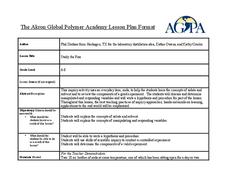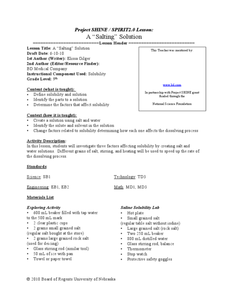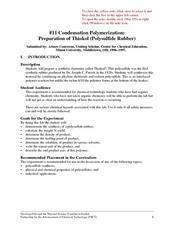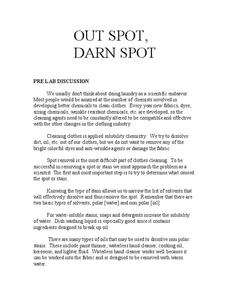Curated OER
Solution Shapes
Eighth graders examine different solutions. In this solution material lesson students complete a lab activity and several worksheets.
Curated OER
Concentration of Solutions
In this solutions worksheet, students determine how the amount of solute in a given amount of solvent effects the concentration of the solution. Students calculate the molarity of solutions. This worksheet has 7 fill in the blank, 3...
Curated OER
Aqueous Solutions
In this aqueous solutions worksheet, students will explore the characteristics of solutions, including the ability of different compounds to dissolve in the solutions. This worksheet has 10 true or false statements and 8 short answer...
Curated OER
Visual Models of Solutions and Concentrations
Students model solutions with beakers of colored glass or plastic spheres. In this solutions lesson, students use beakers of colored spheres to represent pure substances. They mix the spheres to demosntrate solutions. They discuss...
Curated OER
What Are Solutions?
In this solutions worksheet, students brainstorm different types of solutions and an example of each type of solution. This worksheet is a graphic organizer.
Curated OER
Mixtures
Students observe that movement of a solute in the solvent increases the rate of dissolution. They demonstrate that when the solute is broken into smaller pieces it dissolves faster.
Curated OER
What is in the Water?
For this mixtures worksheet, high schoolers read about mixture and what determines if a solute dissolves in a solvent. They answer three questions about solutions and determine from a list of compounds which are soluble in water.
Curated OER
Water Unit
In this water worksheet, students review the properties of water including the density, boiling point, and evaporation. Students define mixture, solute, and solvent. This worksheet has 22 short answer questions.
Curated OER
Finding Concentration
In this determining concentration worksheet, students are given the equations to find the concentration of a solution in grams per milliliter, to determine the concentration in parts per million, to determine percent mass and percent...
Curated OER
Solution Concentration
In this solutions worksheet, students define solute and solvent. Students calculate the concentration of solutions. This worksheet has 4 short answer questions and 4 problems to solve.
Curated OER
Study the Fizz
Students experiment to determine which bottle of soda has more dissolved carbon dioxide. In this solutions lesson, students use the scientific method to test the amount of carbon dioxide in bottles of soda. They identify and explain the...
Curated OER
Solutions
In this solutions worksheet, students answer 18 questions about solutions, saturation of solutions, solvents and solubility.
Curated OER
A “Salting” Solution
Ninth graders investigate the factors affecting solubility. In this chemistry lesson, 9th graders differentiate solvent and solute. They give examples of real world application of solutions.
Pingry School
The Alchemist's Dream – Copper into "Gold"
Many scientists attempted alchemy for hundreds of years before a full understanding of metals became clear. Scholars take a penny and, through two different chemical reactions, make it appear to turn into silver and later gold. They...
Curated OER
Condensation Polymerization: Preparation of Thiokoll® (Polysulfide Rubber)
This lab activity is geared toward experienced chemistry learners, in particular, those who are familiar with organic chemistry. They will create a synthetic elastomer and then make observations and measurements of its different...
PhET
Beer's Law Lab
Beer's Law can be used to measure the concentration of certain compounds in samples of food. In the concentration simulation, particpants change and measure the concentration of different solutions by manipulating various types of...
Curated OER
Solubility and Intermolecular Forces
In this solubility and intermolecular force learning exercise, high schoolers are given 26 clues about forces between molecules such as hydrogen bonds and London forces and about solubility of solutions.
Curated OER
Paper Chromatography
Students investigate the pigments in Magic Markers using chromatography. In this paper chromatography lesson plan, students use absorbent paper and mark the strip with a Magic Marker. They place the strip in a solvent and observe the...
Curated OER
Solubility Curves
In this solubility worksheet, learners use a solubility curve to determine is different solutions are saturated or not. This worksheet has 19 problems to solve and 2 short answer questions.
Curated OER
Molarity Worksheet
For this molarity worksheet, students fill in unknowns such as mass of solute, moles of solute, volume of solution and molarity of solution in a chart with given solvents. They also calculate the molarity of solutions in other problems.
Curated OER
Mixing in the Kitchen
Students identify the different types of mixtures. They identify examples of solutions, suspensions, colloidal dispersions, and emulsions through a game and basic experiments.
University of Georgia
Using Freezing-Point Depression to Find Molecular Weight
Explore the mathematical relationship between a solvent and solute. Learners use technology to measure the cooling patterns of a solvent with varying concentrations of solute. Through an analysis of the data, pupils realize that the rate...
Nuffield Foundation
Making Serial Dilutions
There's no need to water down the resource. A tutorial takes learners through the process of creating dilutions for any solution. Specifically, it focuses on serial dilutions with successive factors of 10.
Serendip
Out Spot, Darn Spot
Encourage your classes to be laundry helpers! Learners explore the chemistry of stain removal with a lab investigation. By identifying the components of the stain, they identify the most effective solute for its removal.

























